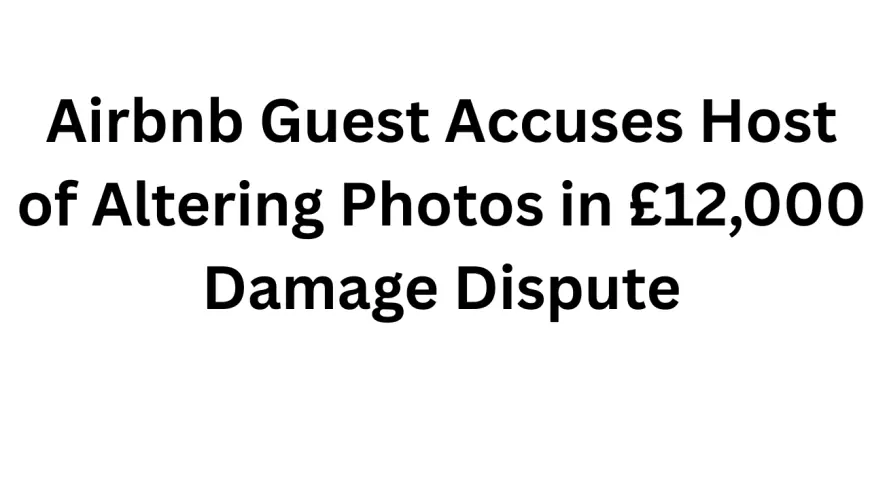Airbnb Guest Accuses Host of Altering Photos in £12,000 Damage Dispute
An Airbnb guest alleges images were digitally altered in a false £12,000 damage claim. Explore the controversy, Airbnb’s response, and what it means for travelers.

A recent controversy has shaken Airbnb’s reputation as a reliable platform for short-term rentals, after a guest accused a host of altering images to support a false £12,000 damage claim. The case, which has gone viral online, has sparked serious discussions about Airbnb’s damage policies, verification processes, and the increasing vulnerability of guests in host-guest disputes.
The incident allegedly took place in the UK, where a traveler rented a luxury property through Airbnb for a short stay. According to the guest, the trip was uneventful, and the property was left in a clean and undamaged state. However, days after checking out, the guest was shocked to receive a message from Airbnb claiming £12,000 worth of property damage, with photographic evidence attached.
Guest Claims Photos Were Digitally Manipulated
The guest, whose identity has been kept anonymous for legal reasons, told media outlets that the photos provided by the host appeared altered or manipulated. The images showed broken furniture, stains, and damage that the guest insists did not exist during or after their stay. The guest immediately challenged the claim, stating they had taken their own time-stamped photos and videos of the property before departure none of which showed any damage.
Experts in digital forensics, after reviewing the contested images, suggested that some signs of digital editing were visible, though this has yet to be formally confirmed by Airbnb’s internal review team. The guest is now requesting a full investigation into the host’s behavior, raising the question: How easy is it to file a fraudulent damage claim on Airbnb?
Airbnb’s Response and Investigation
Airbnb, in a brief public statement, said they are "reviewing the situation carefully" and that guest and host safety remain top priorities. They did not comment directly on the alleged photo editing but stated that all claims undergo a review process, which includes cross-checking timestamps, prior listing conditions, and any media submitted by both parties.
The platform’s AirCover protection, introduced in 2021, is meant to protect both guests and hosts from unfair loss. However, critics argue that the system leans heavily toward host complaints, especially in high-value claims like this one. In many cases, guests are held liable unless they can disprove the claim with clear evidence, putting the burden of proof entirely on the traveler.
Legal and Ethical Implications
If proven true, this incident could have legal implications for both the host and the platform. Submitting digitally altered images as evidence in a financial claim may amount to fraud, which is a criminal offense. In addition, Airbnb could face scrutiny over its handling of such cases, especially if due diligence was not adequately performed before requesting payment from the guest.
Legal analysts note that as peer-to-peer platforms continue to grow, consumer protection frameworks must evolve. Airbnb, like other gig economy platforms, operates globally but often sidesteps local regulations by positioning itself as a neutral third party. This incident may prompt consumer rights advocates to demand stricter verification and dispute resolution mechanisms.
Impact on Airbnb’s Brand Trust
The story has resonated widely on social media, with many former and potential Airbnb users sharing similar stories or expressing fear of being falsely accused in the future. A number of users are now reconsidering their use of the platform for future travel, citing the lack of protection in such high-stake situations.
The incident also raises concerns about the growing reliance on photographic evidence in digital services, especially when such images can be altered using basic editing tools. Without robust verification, image-based claims may become a loophole for fraudulent activity.
What This Means for Future Guests
For travelers, this case serves as a warning. Experts now recommend that guests take detailed photos and videos at check-in and check-out, and even consider emailing them to themselves for date and time verification. While most Airbnb stays go smoothly, cases like this highlight the potential risks when things go wrong and the importance of keeping thorough documentation of the property’s condition.
Until Airbnb and similar platforms improve transparency and accountability in dispute resolutions, guests remain vulnerable to false claims especially when large sums of money are involved.
Conclusion
The allegation that an Airbnb host used digitally altered images to make a false £12,000 damage claim is not just a shocking story it is a potential warning sign for the platform and its users. As the investigation continues, it remains to be seen how Airbnb will respond and whether this case will lead to more stringent guest protections.
Whether it results in policy change or simply greater public awareness, this incident may have a lasting impact on how people use Airbnb and the precautions they take during their stays.
What's Your Reaction?
 Like
0
Like
0
 Dislike
0
Dislike
0
 Love
0
Love
0
 Funny
0
Funny
0
 Angry
0
Angry
0
 Sad
0
Sad
0
 Wow
0
Wow
0















































